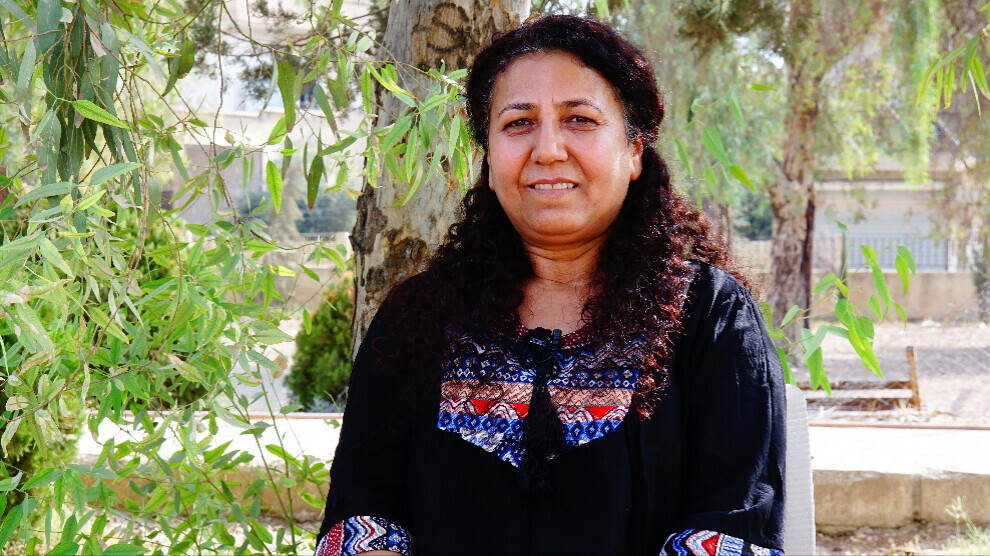"A detainee turned prison into a space of powerful women’s resistance.
Hajar Youssef Khalil, who spent thirty years in Turkish prisons for political activism, said prison became a space for intellectual and spiritual resistance, and that her bond with Öcalan’s ideology remained the force shaping struggle

Sorkhel Sheikho
Qamishlo — Kurdish political prisoners have transformed incarceration into a space for intellectual and revolutionary resistance, affirming that torture and isolation have not broken women’s will but instead deepened their commitment to the struggle for the freedom of peoples. They emphasize that Abdullah Öcalan’s ideology acted as a guiding light inside the cells, turning suffering into a global liberation project.
At the beginning of her testimony, Hajar Youssef Khalil offered a profound description of what prison means for Kurdish women:
“For women, prison carries many layers of meaning. It is a space of resistance and culture, filled with countless significations. If we do not give meaning to our daily existence inside prison, we end up creating another prison within ourselves.”
Suffering Became a Liberation Project
Hajar explained that authoritarian regimes use imprisonment as a tool to separate individuals from their principles and push them away from their aspirations for freedom.
“Even though we could not participate in the struggle outside, surrender was never an option. Instead, new forms of resistance emerged within us.”
She recalled her experiences in court, saying that going to trial was not simply a legal procedure but a moment filled with symbolic and personal meaning:
“When we spoke about the physical torture, the insults, racism, and marginalization we endured as women and as Kurds, it felt as though those abuses were happening again — and we confronted them with firm resolve.”
She emphasized that every period of imprisonment — a year, a month, or even a day — carried its own depth and meaning:
“From the moment of my arrest until the day I was released, I never abandoned the spirit of resistance embodied by Sakine Cansız, Mazlum Doğan, Ferhat Kurtay, and the resistance of July 14.”
Hajar described the importance of understanding the purpose of imprisonment:
“A woman must ask herself: Why am I here? If you struggle for the women of Kurdistan, the Middle East, and the world, then prison becomes a natural extension of a global liberation movement.”
She added that Öcalan’s movement provides a renewed historical vision, and Kurds everywhere should feel responsible for contributing to it.
Inside the cells, the struggle continued with the same intensity as outside:
“Turkish authorities constantly push prisoners toward regret and surrender.”
Hajar explained that women in Turkey are often used as propaganda tools, a reality that requires strong ideological resistance:
“We want to show them they deserve real lives — not the manufactured identities imposed by capitalism and colonialism.”
Even solitary confinement could not break them:
“Giving meaning to the prison’s walls allowed us to transform suffering into inner strength and intellectual maturity.”
“Öcalan’s Thought Was a Beacon in the Darkness of the Cells”
Explaining why she never surrendered, Hajar said:
“After Öcalan was placed in solitary confinement and deprived of basic rights, I could no longer claim that my suffering was the greatest. His isolation gave us strength.”
Her ideological bond with Öcalan became existential:
“We constantly rediscovered his ideas. They opened space for reflection and self-criticism.”
She noted that Öcalan’s imprisonment is not just Turkish policy but part of an international strategy:
“These plans are designed globally and executed by Turkey.”
For this reason, the women prisoners launched hunger strikes and wrote letters that often never reached him.
Attempts by authorities to sever communication between women prisoners were deliberate, she said:
“They knew these messages strengthened our morale and solidarity.”
Despite this, they continued to honor Öcalan through weekly speeches and collective expressions of support.
“Prison Does Not Extinguish the Flame of Revolution”
Hajar explained that forms of torture varied across decades:
“Physical torture dominated earlier periods; today psychological torture is more common but equally destructive.”
She recalled some of the most painful memories, including the self-sacrificing actions of Kurdish prisoners whose resistance set the prisons ablaze with revolutionary spirit.
The deaths of Kurda and the severe wounding of Rotinda left a lasting emotional impact:
“Those moments carved deep scars, but they also strengthened our understanding of sacrifice.”
“From an Independent Kurdistan to a Democratic Nation”
Hajar highlighted the political shift inspired by Öcalan’s philosophy:
“We moved from dreaming of an independent state to envisioning a democratic society based on democratic confederalism in the Middle East.”
The struggle expanded beyond Kurdish nationalism into a global humanistic cause:
“Humanity today faces existential crises, and through building a free Kurdistan and democratic regions in Syria, Turkey, Iraq, and Iran, we can revive the hope that people can live with freedom and dignity.”
She concluded by praising Öcalan’s call for peace and democratic unity on February 27, describing it as the beginning of a new transformative phase.
“If Turkey, Syria, and Iraq become democratic, their peoples can organize themselves through the model of the democratic nation. It may be a long road, but it is achievable. Öcalan is reshaping the foundations destroyed by capitalism into a project for all humanity
